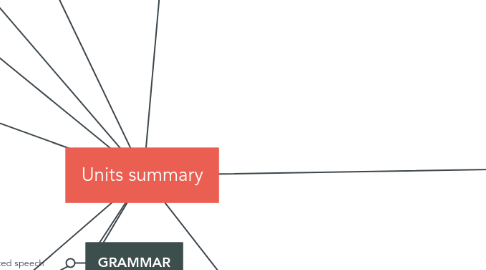
1. -We can use modals verbs to show that we are making a decution using evidence, not stating a fact. -Different modal verbs tell us how sure about deduction •must sure •may / might / could It is possible that it is •may / might not It is possible that it is not •can not I am sure it is
2. GRAMMAR
2.1. Reported speech
3. Modals of deduction
3.1. •When we talk about what somebody said or thought, we can use diredt speech or reported speech: REPORTED QUESTIONS: •When you report Wh-questions, putt he subject before the verb. Do not use the auxiliary: do/does/did OTHER CHANGES •When we repot speech we usually need to change the pronouns and possesives, depending on who is talking to whom. Time and place words may also need to change.
4. Modals of obligation
4.1. -MUST • We use must when we make the rules. -HAVE TO • we use have to when we talk about other peoples rules -MUSTN'T, CAN'T, AND DON'T HAVE TO -We use mus not or can not to say that something is not allowed. -We often mus not when we make the rules and can not to talk about other peoples rules. -We use do not have to when there is no obligation It means It is not necessary to do something.
5. Comparatives and superlatives
5.1. We can use comparative adjectives and adverbs to compare two things, situations, times, actions. Usually with that • The opposite of more is less. We can use it with all adjectives and adverbs. • We use superlative adjectives and adverbs to talk about extremes.
6. Quantifiers
6.1. • We usually use some in positive statements and any in negatives and questions. • We use lots of / a lot of in positive sentences, not many/ not much/ not a lot of in negative sentences. • We use a few/ a little about an moment • We use too much/ too many + noun to say there is more that the right amount.
7. Verb patterns
7.1. • Verb + ing (eg: enjoy, mind keep, admitted, recommend, suggest) • By to + infinitive (eg: want, hope, agree, ofther, promise, need, refuse, plan) • With no change of meaning (eg: start, begin, continue) • but the meaning changes (eg: try, forget, remember) • an object before to + infinitive (eg: advise, ask, invite, remind, tell, warn)
8. VOCABULARY
8.1. UNIT 6:
8.1.1. Pedestrian crossing • Air conditioning • Rush hour • Traffic lights • Traffic jam • Cycle lane • Rich • Crunchy • go back • go away
8.2. UNIT 7:
8.2.1. • Moving house • Renting • Floor • Black • Views • Location • Neighbourhood • Balcony • Into • Black of flats • First floor
8.3. UNIT 8:
8.3.1. • Be able to afford • Be in stock • Be on sale • Come out • Get a refund • Good value • Have a guarantee • Look for a bargain • Currents affairs • Breaking news • Celebrity gossip
8.4. UNIT 9:
8.4.1. • Thriller • Documentary • Chat show • Comedy • Game show • Action • Science fiction • Drama • Animation • Choir • DJ • Play live • Festival • Musician
8.5. UNIT 10:
8.5.1. • Table tennis • Snowboarding • Volleyball • Wresting • Diving • Ski jumping • Tennis • Surfing

